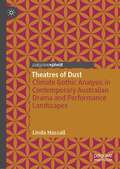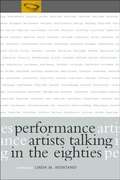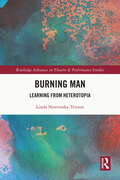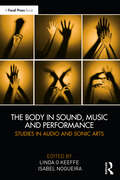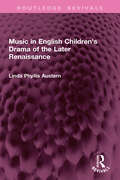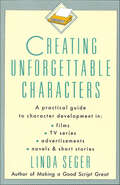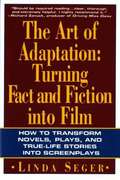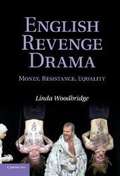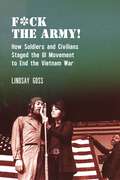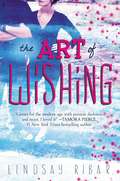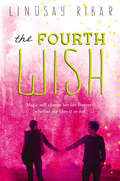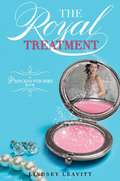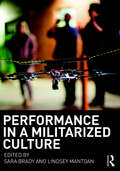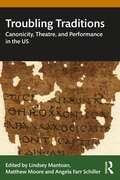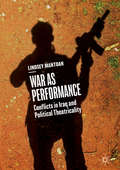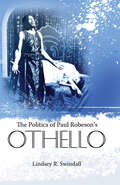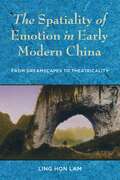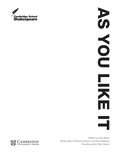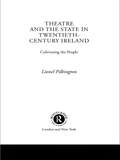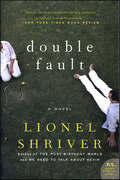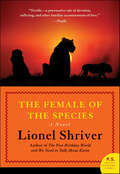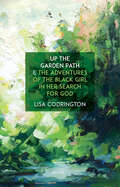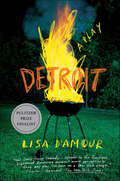- Table View
- List View
Theatres of Dust: Climate Gothic Analysis in Contemporary Australian Drama and Performance Landscapes
by Linda HassallThrough a contemporary Gothic lens, the book explores theatre theories, processes and practices that explore; the impacts of continuing drought and natural disaster, the conflicts concerning resource extraction and mining and current political debates focussed on climate change denial. While these issues can be argued from various political and economic platforms, theatrical investigations as discussed here suggest that scholars and theatre makers are becoming empowered to dramaturgically explore the ecological challenges we face now and may face in the future. In doing so the book proposes that theatre can engage in not only climate change analysis and discussion but can develop climate literacies in a broader socio-cultural context.
Performance Artists Talking in the Eighties
by Linda M. MontanoThe interaction of the performance artist Linda Montano with other performance artists to consider how early events associated with sex, food, money/fame, or death/ritual resurfaced in their later work has resulted in a talking performance that documents the production of art in a misunderstood community. Her discussions with more than 100 artists, focused on the relationship between art and life, history and memory, the individual and society, and the potential for individual and social change.
Burning Man: Learning from Heterotopia (Routledge Advances in Theatre & Performance Studies)
by Linda Noveroske-TrittenThis book centres on a philosophical analysis of creative acts in the Burning Man Festival and their roles in wider social change. With particular focus on the Ten Principles of Burning Man, Linda Noveroske posits a re-interpretation of common notions of “self” and “other” as they apply to identity, difference, and the ways that these personal impulses ripple outward from changing individuals into changing societies. Such radical re-imagination of ideology can be most powerful when it occurs in spaces of otherness, of heterotopia. This study casts Burning Man as a heterotopia to not only destabilizes what we think we know about visual art, performance, and creative encounters, but also bring these acts into an attitude of immediacy that facilitates previously unimagined behaviour and opens out artistic drive into the unknown. This book would be of value for scholars and practitioners in Performance Studies, Theatre and Dance, Art History, Psychology, Phenomenology, Architecture and Urban Studies.
The Body in Sound, Music and Performance: Studies in Audio and Sonic Arts
by Linda O KeeffeThe Body in Sound, Music and Performance brings together cutting-edge contributions from women working on and researching contemporary sound practice. This highly interdisciplinary book features a host of international contributors and places emphasis on developments beyond the western world, including movements growing across Latin America. Within the book, the body is situated as both the site and centre for knowledge making and creative production. Chapters explore how insightful theoretical analysis, new methods, innovative practises, and sometimes within the socio-cultural conditions of racism, sexism and classicism, the body can rise above, reshape and deconstruct understood ideas about performance practices, composition, and listening/sensing. This book will be of interest to both practitioners and researchers in the fields of sonic arts, sound design, music, acoustics and performance.
Music in English Children's Drama of the Later Renaissance (Routledge Revivals)
by Linda Phyllis AusternOriginally published in 1992, Music in English Children’s Drama of the Later Renaissance is the first book-length study to examine the Elizabethan and Jacobean children’s drama, not only from a musicological perspective, but also drawing on the histories of literature, culture, and the theater. It gives the children’s companies new historical significance, showing that they were an integral and ultimately influential part of the London theatrical world. These companies originated important features of later drama, such as music before and between acts, and the exploitation of different timbres for specific effects.Those interested in music history, English literature, theater history, and cultural history will find this a comprehensive and fascinating study. Of special note are the appendices, which offer a unique and important reference source by providing the only definitive list of the plays and songs used by the children.
Creating Unforgettable Characters: A Practical Guide to Character Development in Films, TV Series, Advertisements, Novels & Short Stories
by Linda SegerFrom a longtime script consultant, “a vital aid to all writers, novelists, and screenwriters . . . invaluable” (Gale Anne Hurd, producer, The Walking Dead and Aliens).In this book, Linda Seger, author of Making a Good Script Great, shows how to create strong, multidimensional characters in fiction, covering everything from research to character block. She introduces concepts designed to stimulate the creative process, combining them with practical techniques and exercises. She also offers specific advice on creating nonfiction and fantasy characters, and case studies of such classics as Ordinary People and the sitcom Cheers.Addressing topics from backstory development to character psychology to avoiding stereotypes, Creating Unforgettable Characters is an excellent resource for writers in any genre or creative field. Interviews with successful professional writers complete this essential volume.
The Art of Adaptation: Turning Fact and Fiction Into Film (Owl Books Ser.)
by Linda SegerAdaptations have long been a mainstay of Hollywood and the television networks. Indeed, most Academy Award- and Emmy Award-winning films have been adaptations of novels, plays, or true-life stories. Linda Seger, author of two acclaimed books on scriptwriting, now offers a comprehensive handbook for screenwriters, producers, and directors who want to successfully transform fictional or factual material into film. Seger tells how to analyze source material to understand why some of it resists adaptation. She then gives practical methods for translating story, characters, themes, and style into film. A final section details essential information on how to adapt material and how to protect oneself legally
English Revenge Drama: Money, Resistance, Equality
by Linda WoodbridgeVengeance permeates English Renaissance drama - for example, it crops up in all but two of Shakespeare's plays. This book explores why a supposedly forgiving Christian culture should have relished such bloodthirsty, vengeful plays. A clue lies in the plays' passion for fairness, a preoccupation suggesting widespread resentment of systemic unfairness - legal, economic, political, and social. Revengers' precise equivalents - the father of two beheaded sons obliges his enemy to eat her two sons' heads - are vigilante versions of Elizabethan law, where penalties suit the crimes: thieves' hands were cut off, scolds' tongues bridled. The revengers' language of 'paying' hints at the operation of revenge in the service of economic redress. Revenge makes contact with resistance theory, justifying overthrow of tyrants, and some revengers challenge the fundamental inequity of social class. Woodbridge demonstrates how, for all their sensationalism, their macabre comedy and outlandish gore, Renaissance revenge plays do some serious cultural work.
F*ck The Army!: How Soldiers and Civilians Staged the GI Movement to End the Vietnam War (Performance and American Cultures #7)
by Lindsay GossReveals the theatrical dimensions of civilian support for the revolutionary GI Movement of the 1960s-70sPerformance played a role both crucial and complicated in the antiwar activism of the 1960s and 1970s. As soldiers and civilian actors, activists, and celebrities worked together to end the Vietnam War, their theatrical acts of solidarity and resistance connected liberation struggles across the lines of race, gender, enlisted status, and nationality.F*ck The Army! offers the first, fully narrated history of the FTA, an antiwar variety show featuring Jane Fonda that played to tens of thousands of active-duty troops over the course of nine months in 1971. From its very conception, the civilian-led show was directed towards the project of making visible the growing antiwar movement organized by GIs, inspired by but also acting as a rebuttal to the increasingly out-of-touch USO tours presented by Bob Hope. Through an analysis of the FTA’s tactical performances of solidarity and resistance, Lindsay Goss brings into view the theatrical dimensions of the GI movement itself, revealing it as representative of the revolutionary and theatrical politics and tactics of the period. The volume highlights how, due to the movement’s subsequent historical erasure, a renewed anti-theatricality emerged from the 1960s and became a potent feature of contemporary political discourse.The author’s deft methodological and analytic strategies, in tandem with her elegantly accessible style demonstrate how seemingly little-known performance practices can activate consequential understandings of what we thought we knew about the recent past. At the same time, she encourages essential conversations about pressing contemporary issues that demand our attention. At its core, F*ck The Army! reveals the fundamentally theatrical character of radical activism when it seeks to challenge the status quo.
The Art of Wishing
by Lindsay Ribar"[With] a genie like no other. . . this lighthearted book is a well-rounded combination of humor, romance and paranormal suspense, with likable characters and easy-to-believe dialogue. " (Kirkus Reviews) Margo McKenna has a plan of attack for everything, from landing the lead in her high school musical to dealing with her increasingly absent parents. But when she finds herself in possession of a genie's ring and the opportunity to make three wishes, she doesn't know what to do. Especially since Oliver--not blue-skinned, not bottle-dwelling, but a genie nonetheless--can see more than what she's willing to show him. With one peek into her mind, he can see the wishes that even Margo herself doesn't know she wants. But Oliver comes with more than just mind-reading abilities, a flair for magic, and the prettiest eyes Margo's ever seen. Someone from his past is hunting him--someone bent on killing him, along with all the other genies in the world, for the sake of honor. And as Margo soon discovers, it will take more than three wishes to save him. A whole lot more. .
The Fourth Wish
by Lindsay RibarHere's what Margo McKenna knows about genies: She's seen Aladdin more times than she can count; she's found a magic genie ring and made her three allotted wishes; she's even fallen head over heels in love with Oliver, the cute genie whose life she saved by fighting off another genie. But none of this prepared her for the shock of becoming a genie herself. Everything Margo's taken for granted--graduating high school, going to college, hating math, performing in the school musical, even being a girl--is in question. Just at a time when she's trying to figure out who she wants to be, Margo is forced to become whomever her master wants. But Margo is also coming into a power she never imagined she'd have. How will she reconcile the two? And where will she and Oliver stand when she's done? Fans of Every Day and Anna and the French Kiss will love this romantic, magical, and surprising conclusion to The Art of Wishing.
The Royal Treatment (A Princess For Hire Book Series)
by Lindsey LeavittWhat girl wouldn’t swoon over the outrageous perks in Desi's life as a princess substitute? <P><P>Desi gets to hang out with crush-worthy Prince Karl, and the Façade agency has taken a special interest in her magical abilities. <P><P>But between sub training, starting the eighth grade, and dealing with the cute-but-bossy new boy Reed, she’s beginning to feel like she’s in over her head. <P><P>Even worse, when Desi learns a secret about the magic that keeps Façade running, she realizes that not everything is as perfect as it seems. <P><P> Perfect for fans of The Princess Diaries and full of humor and heart, this second installment in the Princess for Hire series shows Desi that the royal treatment may just be masking mysteries, and only she can uncover the truth....one princess at a time!
Performance in a Militarized Culture
by Sara Brady Lindsey MantoanThe long cultural moment that arose in the wake of 9/11 and the conflict in the Middle East has fostered a global wave of surveillance and counterinsurgency. Performance in a Militarized Culture explores the ways in which we experience this new status quo. Addressing the most commonplace of everyday interactions, from mobile phone calls to traffic cameras, this edited collection considers: How militarization appropriates and deploys performance techniques How performing arts practices can confront militarization The long and complex history of militarization How the war on terror has transformed into a values system that prioritizes the military The ways in which performance can be used to secure and maintain power across social strata Performance in a Militarized Culture draws on performances from North, Central, and South America; Europe; the Middle East; and Asia to chronicle a range of experience: from those who live under a daily threat of terrorism, to others who live with a distant, imagined fear of such danger.
Troubling Traditions: Canonicity, Theatre, and Performance in the US
by Lindsey MantoanTroubling Traditions takes up a 21st century, field-specific conversation between scholars, educators, and artists from varying generational, geographical, and identity positions that speak to the wide array of debates around dramatic canons. Unlike Literature and other fields in the humanities, Theatre and Performance Studies has not yet fully grappled with the problems of its canon. Troubling Traditions stages that conversation in relation to the canon in the United States. It investigates the possibilities for multiplying canons, methodologies for challenging canon formation, and the role of adaptation and practice in rethinking the field’s relation to established texts. The conversations put forward by this book on the canon interrogate the field’s fundamental values, and ask how to expand the voices, forms, and bodies that constitute this discipline. This is a vital text for anyone considering the role, construction, and impact of canons in the US and beyond.
War as Performance: Conflicts in Iraq and Political Theatricality
by Lindsey MantoanThis book examines performance in the context of the 2003 Iraq War and subsequent conflicts with Daesh, or the so-called Islamic State. Working within a theater and performance studies lens, it analyzes adaptations of Greek tragedy, documentary theater, political performances by the Bush administration, protest performances, satiric news television programs, and post-apocalyptic narratives in popular culture. By considering performance across genre and media, War as Performance offers an interdisciplinary approach to the study of culture, warfare, and militarization, and argues that spectacular and banal aesthetics of contemporary war positions performance as a practice struggling to distance itself from appropriation by the military for violent ends. Contemporary warfare has infiltrated our narratives to such an extent that it holds performance hostage. As lines between the military and performance weaken, this book analyzes how performance responds to and potentially shapes war and conflict in the new century.
The Politics of Paul Robeson's Othello (Margaret Walker Alexander Series in African American Studies)
by Lindsey R. SwindallLindsey R. Swindall examines the historical and political context of acclaimed African American actor Paul Robeson’s three portrayals of Shakespeare’s Othello in the United Kingdom and the United States. These performances took place in London in 1930, on Broadway in 1943, and in Stratford-upon-Avon in 1959. All three of the productions, when considered together, provide an intriguing glimpse into Robeson’s artistry as well as his political activism. The Politics of Paul Robeson’s Othello maintains that Robeson’s development into a politically minded artist explicates the broader issue of the role of the African American artist in times of crisis. Robeson (1898–1976) fervently believed that political engagement was an inherent component of the role of the artist in society, and his performances demonstrate this conviction. In the 1930 production, audiences and critics alike confronted the question: Should a Black actor play Othello in an otherwise all-white cast? In the 1943 production on Broadway, Robeson consciously used the role as a form for questioning theater segregation both onstage and in the seats. In 1959, after he had become well known for his leftist views and sympathies with Communism, his performance in a major Stratford-upon-Avon production called into question whether audiences could accept onstage an African American who held radical—and increasingly unpopular—political views. Swindall thoughtfully uses Robeson’s Othello performances as a collective lens to analyze the actor and activist’s political and intellectual development.
The Spatiality of Emotion in Early Modern China: From Dreamscapes to Theatricality
by Ling Hon LamEmotion takes place. Rather than an interior state of mind in response to the outside world, emotion per se is spatial, at turns embedding us from without, transporting us somewhere else, or putting us ahead of ourselves. In this book, Ling Hon Lam gives a deeply original account of the history of emotions in Chinese literature and culture centered on the idea of emotion as space, which the Chinese call “emotion-realm” (qingjing).Lam traces how the emotion-realm underwent significant transformations from the dreamscape to theatricality in sixteenth- to eighteenth-century China. Whereas medieval dreamscapes delivered the subject into one illusory mood after another, early modern theatricality turned the dreamer into a spectator who is no longer falling through endless oneiric layers but pausing in front of the dream. Through the lens of this genealogy of emotion-realms, Lam remaps the Chinese histories of morals, theater, and knowledge production, which converge at the emergence of sympathy, redefined as the dissonance among the dimensions of the emotion-realm pertaining to theatricality.The book challenges the conventional reading of Chinese literature as premised on interior subjectivity, examines historical changes in the spatial logic of performance through media and theater archaeologies, and ultimately uncovers the different trajectories that brought China and the West to the convergence point of theatricality marked by self-deception and mutual misreading. A major rethinking of key terms in Chinese culture from a comparative perspective, The Spatiality of Emotion in Early Modern China develops a new critical vocabulary to conceptualize history and existence.
Found Life: Poems, Stories, Comics, a Play, and an Interview (Russian Library)
by Linor GoralikOne of the first Russian writers to make a name for herself on the Internet, Linor Goralik writes conversational short works that conjure the absurd in all its forms, reflecting post-Soviet life and daily universals. Her mastery of the minimal, including a wide range of experiments in different forms of micro-prose, is on full display in this collection of poems, stories, comics, a play, and an interview, here translated for the first time. In Found Life, speech, condensed to the extreme, captures a vivid picture of fleeting interactions in a quickly moving world. Goralik's works evoke an unconventional palette of moods and atmospheres—slight doubt, subtle sadness, vague unease—through accumulation of unexpected details and command over colloquial language. While calling up a range of voices, her works are marked by a distinct voice, simultaneously slightly naïve and deeply ironic. She is a keen observer of the female condition, recounting gendered tribulations with awareness and amusement. From spiritual rabbits and biblical zoos to poems about loss and comics about poetry, Goralik's colorful language and pervasive dark comedy capture the heights of ridiculousness and the depths of grief.
As You Like It
by Richard Andrews Linzy Brady Vicki Wienand & Rex GibsonMichael Hattaway's Introduction to this bestselling edition of As You Like It accounts for what makes this popular play both innocent and dangerous. This third edition includes a new section on recent critical interpretations, including sections on ecocriticism, peace studies, and myths of gender, on recent as well as past stage productions and films of the play, as well as fresh illustrations. An appendix on an early court performance in 1599, commentary on the play's language, the book trade, and the discursive cultures of its time, as well as an updated reading list are also included.
Theatre and the State in Twentieth-Century Ireland: Cultivating the People
by Lionel PilkingtonThis major new study presents a political and cultural history of some of Ireland's key national theatre projects from the 1890s to the 1990s. Impressively wide-ranging in coverage, Theatre and the State in Twentieth-Century Ireland: Cultivating the People includes discussions on: *the politics of the Irish literary movement at the Abbey Theatre before and after political independence; *the role of a state-sponsored theatre for the post-1922 unionist government in Northern Ireland; *the convulsive effects of the Northern Ireland conflict on Irish theatre. Lionel Pilkington draws on a combination of archival research and critical readings of individual plays, covering works by J. M. Synge, Sean O'Casey, Lennox Robinson, T. C. Murray, George Shiels, Brian Friel, and Frank McGuinness. In its insistence on the details of history, this is a book important to anyone interested in Irish culture and politics in the twentieth century.
Double Fault: A Novel
by Lionel Shriver“Shriver shows in a masterstroke why character is fate and how sport reveals it.” —New York Times Book ReviewFrom the author of the New York Times bestseller The Post-Birthday World, and the international bestseller We Need to Talk About Kevin comes a brilliant and unflinching novel about the devastating cost of prizing achievement over loveTennis has been Willy Novinsky's one love ever since she first picked up a racquet at the age of four. A middle-ranked pro at twenty-three, she's met her match in Eric Oberdorf, a low-ranked, untested Princeton grad who also intends to make his mark on the international tennis circuit. Eric becomes Willy's first passion off the court, and eventually they marry. But while wedded life begins well, full-tilt competition soon puts a strain on their relationship—and an unexpected accident sends driven and gifted Willy sliding irrevocably toward resentment, tragedy, and despair.
The Female of the Species: A Novel
by Lionel Shriver“Shriver’s debut is a 'literary' novel without an iota of pretentiousness. It reads with the grace of a well-written spy story, but conveys some of its author’s early wisdom about what our humanity both demands of and grants us.” —Washington PostThe first novel by the New York Times bestselling author Lionel Shriver, The Female of the Species is the exotic and chilling story of a highly independent and successful woman’s late-life romantic education, in all its ecstasy and desperationStill unattached and childless at fifty-nine, world-renowned anthropologist Gray Kaiser is seemingly invincible—and untouchable. Returning to make a documentary at the site of her first great triumph in Kenya, she is accompanied by her faithful middle-aged assistant, Errol McEchern, who has loved her for years in silence. When sexy young graduate assistant Raphael Sarasola arrives on the scene, Gray is captivated and falls hopelessly in love—before an amazed and injured Errol's eyes. As he follows the progress of their affair with jealous fascination, Errol watches helplessly from the sidelines as a proud and fierce woman is reduced to miserable dependence through subtle, cruel, and calculating manipulation.
On Stage: Theater Games and Activities for Kids
by Lisa Bany-WintersLights, camera, play! With this second edition of On Stage: Theater Games and Activities for Kids, budding thespians will have fun under the footlights as they choose from more than 125 theater games that spark creativity, boost confidence, and encourage collaboration. They'll learn all about how to make a stage performance great with improvisational games such as Freeze, Party Quirks, the Yes Game, and Gibberish; they'll make puppets, discover makeup secrets, and design and build a set. This revised and expanded edition features 35 new improvisational games and ready-to-use monologues, scenes, and short plays. Whether playing alone or in a group, everyone can have theater fun with On Stage!
Up the Garden Path & The Adventures of the Black Girl in Her Search for God
by Lisa CodringtonIn Up the Garden Path, Rosa, a young Barbadian seamstress, offers to pose as her brother to go to the Niagara Region in Ontario to work. There, she meets an aspiring actress obsessed with Joan of Arc, the ghost of a black Loyalist soldier who wants to die and a boss who can’t keep the starlings away from his failing vineyard. Finding it impossible to ignore their demands, but not wanting to be found out and sent home, Rosa has to stop and figure out what she really wants instead of what everyone around her needs. Based on Bernard Shaw’s short story, The Adventures of the Black Girl in Her Search for God follows a black girl who is abandoned by a white missionary for asking too many questions. Taking matters into her own hands, the Black Girl sets off to find out who or what God really is. Along the way she meets a number of characters who have very different views on God, but the Black Girl’s unrelenting questions create conflict, and in the end she’s forced to make her own decisions on God and her search.
Detroit: A Play
by Lisa D'AmourIn a "first ring" suburb outside a midsize American city, Ben and Mary fire up the grill to welcome the new neighbors who've moved into the long-empty house next door. The fledgling friendship soon veers out of control, shattering the fragile hold that newly unemployed Ben and burgeoning alcoholic Mary have on their way of life—with unexpected comic consequences. Detroit is a fresh, offbeat look at what happens when we dare to open ourselves up to something new. After premiering at Chicago's Steppenwolf Theatre last year to rave reviews, Lisa D'Amour's brilliant and timely play moves to Broadway this fall.
